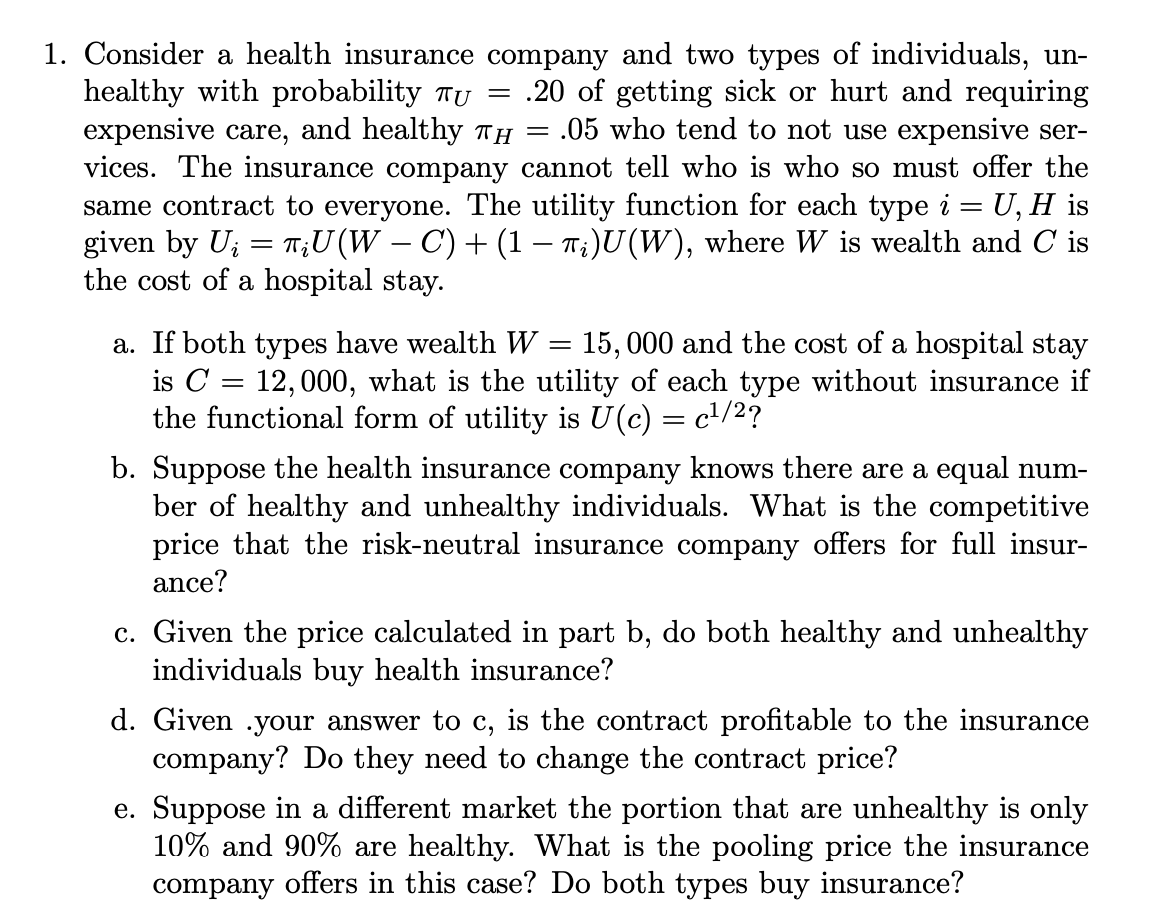 Only answer to e) is needed. The rest is here for your reference. I will report plagiarism and spam, thank you.
Only answer to e) is needed. The rest is here for your reference. I will report plagiarism and spam, thank you.
= 1. Consider a health insurance company and two types of individuals, un- healthy with probability au .20 of getting sick or hurt and requiring expensive care, and healthy TH = .05 who tend to not use expensive ser- vices. The insurance company cannot tell who is who so must offer the same contract to everyone. The utility function for each type i = U, H is given by Vi = 1;U(W C) + (1 7;)U(W), where W is wealth and C is the cost of a hospital stay. = = = a. If both types have wealth W 15,000 and the cost of a hospital stay is C = 12,000, what is the utility of each type without insurance if the functional form of utility is U(c) = c1/2? b. Suppose the health insurance company knows there are a equal num- ber of healthy and unhealthy individuals. What is the competitive price that the risk-neutral insurance company offers for full insur- ance? c. Given the price calculated in part b, do both healthy and unhealthy individuals buy health insurance? d. Given .your answer to c, is the contract profitable to the insurance company? Do they need to change the contract price? e. Suppose in a different market the portion that are unhealthy is only 10% and 90% are healthy. What is the pooling price the insurance company offers in this case? Do both types buy insurance? = 1. Consider a health insurance company and two types of individuals, un- healthy with probability au .20 of getting sick or hurt and requiring expensive care, and healthy TH = .05 who tend to not use expensive ser- vices. The insurance company cannot tell who is who so must offer the same contract to everyone. The utility function for each type i = U, H is given by Vi = 1;U(W C) + (1 7;)U(W), where W is wealth and C is the cost of a hospital stay. = = = a. If both types have wealth W 15,000 and the cost of a hospital stay is C = 12,000, what is the utility of each type without insurance if the functional form of utility is U(c) = c1/2? b. Suppose the health insurance company knows there are a equal num- ber of healthy and unhealthy individuals. What is the competitive price that the risk-neutral insurance company offers for full insur- ance? c. Given the price calculated in part b, do both healthy and unhealthy individuals buy health insurance? d. Given .your answer to c, is the contract profitable to the insurance company? Do they need to change the contract price? e. Suppose in a different market the portion that are unhealthy is only 10% and 90% are healthy. What is the pooling price the insurance company offers in this case? Do both types buy insurance
 Only answer to e) is needed. The rest is here for your reference. I will report plagiarism and spam, thank you.
Only answer to e) is needed. The rest is here for your reference. I will report plagiarism and spam, thank you.





